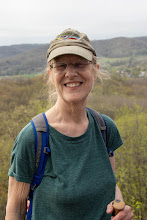If you work with kids, you know that creating, planning, booking and doing programs takes a chunk of our work life. Because it is such an uber-part of our time, I can't help thinking about it and asking why it is we do what we do. Why,
really, do we program? Is it to entertain? Is it to educate? Is it to get people to the library?
I'm pretty old school about it. For me, we create programs at the library to draw people into our buildings, to create a pleasant library experience and to highlight our collections, increase check-out and support literacy. Thinking about programs this way helps me plan realistically, create breaks for patrons and staff rather than program year-round and helps focus our energy. If programs are doing what they should, our usage and circulation should be directly affected in a positive way.
I like programs that relate to books and literacy and our collection (storytimes and book parties, I heart you). I like programs that piggyback onto pop culture interests of kids and debuting media that allows us to ride a popularity wave while relating back to our books and collections. I am less impressed with clowns, magicians and other performers that our community kids can see any and everywhere around here. I'm not saying we never book them, but I always wonder how it relates to what we are doing in a larger sense.
I've also been thinking alot lately about the non-traditional program initiatives we're involved in and we've read about at other libraries -
1000 Books Before Kindergarten,
Summer Library Programs (yep, we all do SLP's but do we realize they are "programs" in and of themselves?)
Story Action Pods, Free-quent Reader Club, Between-Storytime Coupon Books,Winter Reading programs, etc. These initiatives are often run over a long period of time and fit all my definitions of programs listed above. What is their place in our program sphere?
Every time we plan and create one of these initiatives, we see people flocking in, circ increasing and interest in books and literacy skyrocket. Yet we don't necessarily "see" them as programs or count them as programs in terms of attendance. I think that's a mistake.
What I love about the above initiatives is that beyond the initial planning and very minimal daily administration, they take little staff time. They allow much greater staff-child interaction in the most pleasant way than almost all our traditional programs ("Wow, look at all the books you listened to!"; "Which one of these activities did you enjoy most this week?"; "What's going on in this picture?"). Much of the interaction leads to conversations about reading and books that are fundamentally important in creating a feeling of comfort and worth for these kids.
Yet, we barely count them as programs and the statistics are almost hidden. We know and report how many kids sign-up for Summer Reading Program - but if we looked at participation (how many times did kids return to the library) - an initial participation rate of 521 kids skyrockets to over 2,000 return visits made to the library by these readers. But that is usually a lost statistic. Same for 1000 Books Before Kindergarten Club. 400 kids are being read to but we've had over 1,100 return visits to the library.
These initiatives - passive programs in a way or value-added programs in another light, or perhaps, best of all,
stealth programs! - create just as much, and often more, response and participation than our traditional programs. We find ourselves in times of shrinking budgets turning more towards them. Since our state required program statistics only recognize traditional programming stats, we are discussing at our library how to recognize the importance of these unreported statistics that correlate to huge circulation increases and much busier Children's area.
We think they are programs. How about you?
Image: 'Juggler' http://www.flickr.com/photos/69444890@N00/404640681
 We offer one-two events per year for our 1000 Books families. We often hold them before or after hours so the tots and parents get exclusive use of our space and non-stop attention from staff. We might have a concert, or a cookie party with Laura Numeroff's Mouse, or mac and cheese and a chance to browse the room. We posted about last fall's Brown Bear event here. Whatever we focus on we make sure to invite our 1000 Books families and let them know something special is about to happen for them.
We offer one-two events per year for our 1000 Books families. We often hold them before or after hours so the tots and parents get exclusive use of our space and non-stop attention from staff. We might have a concert, or a cookie party with Laura Numeroff's Mouse, or mac and cheese and a chance to browse the room. We posted about last fall's Brown Bear event here. Whatever we focus on we make sure to invite our 1000 Books families and let them know something special is about to happen for them.






